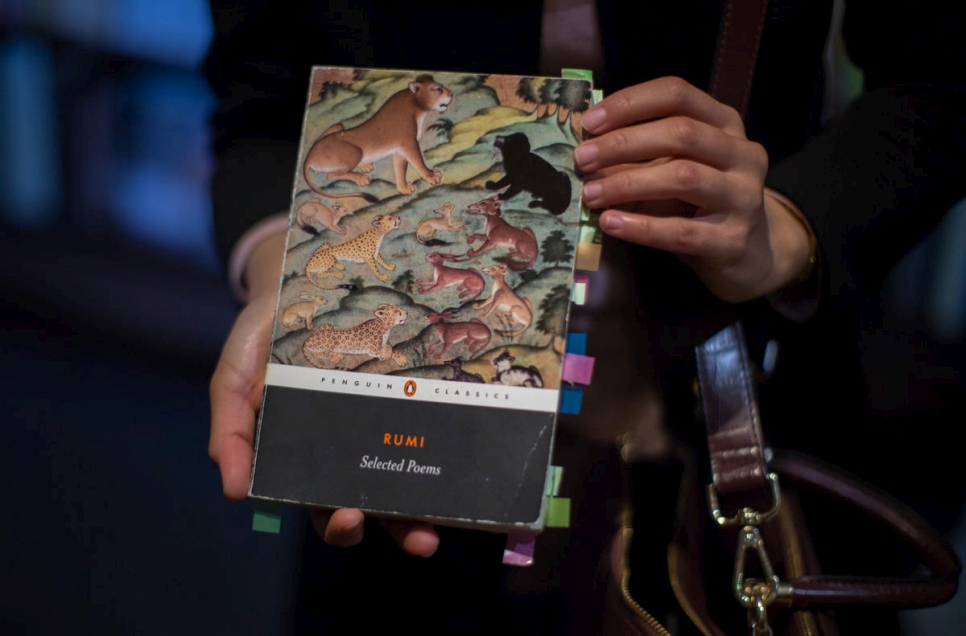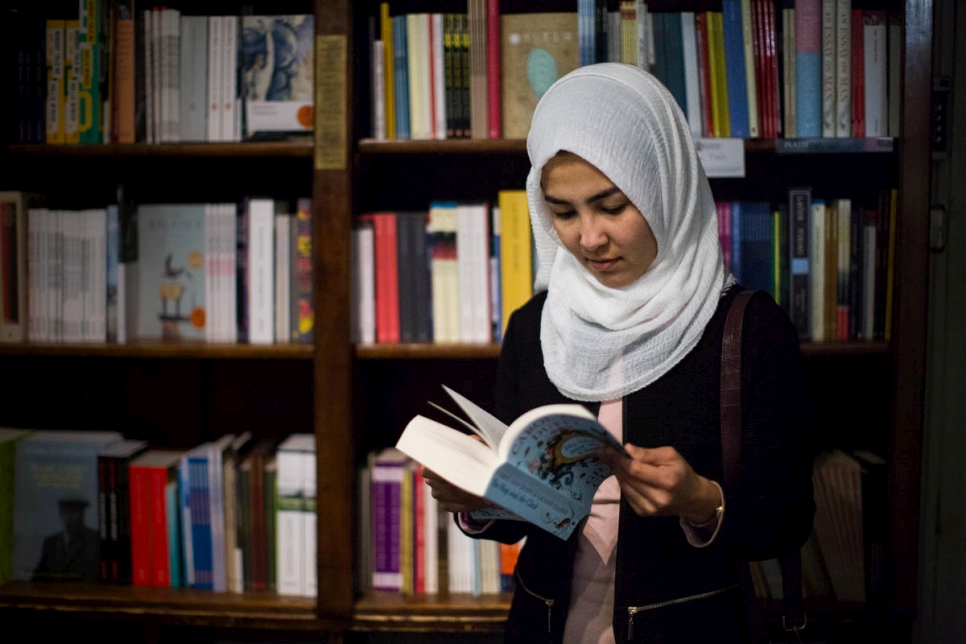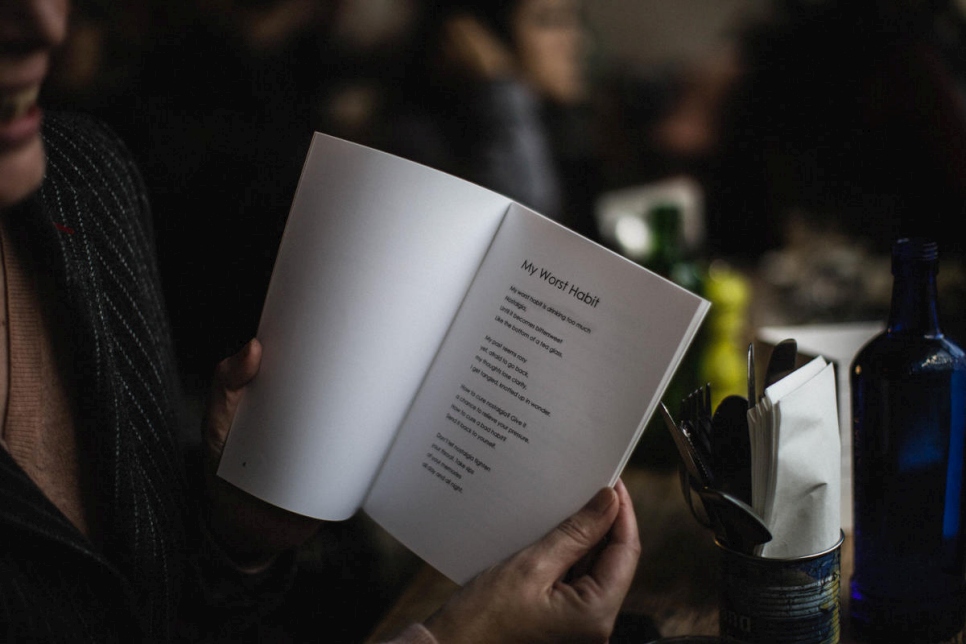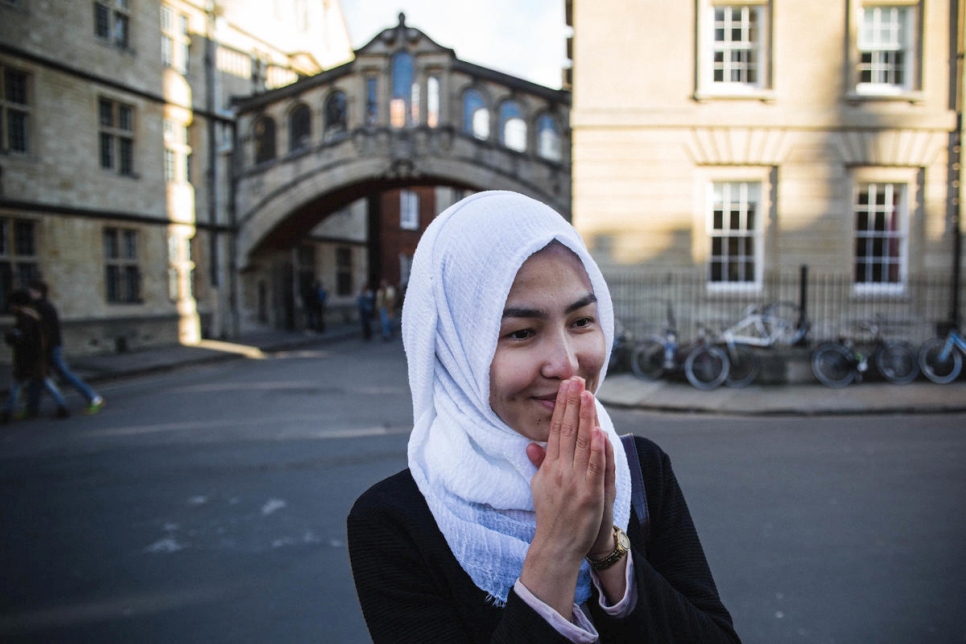Poetry helps Afghan girl find her path in England
Hazara refugee started education at Afghan school 'two mountains away' from home; after finding refuge in UK, her literary skills have blossomed, helped by Oxford poetry group
As a shy, 15-year-old Hazara refugee, Shukria Rezaei arrived in Oxford with little grasp of English. She is now an award-winning and published poet.
© UNHCR/Jessica Lindgren-Wu
OXFORD, England – No one, not her family, her teachers, nor any of her 900 schoolmates, was more surprised than Shukria Rezaei herself, when she was judged the best poet in her year. A shy, 15-year-old Afghan girl, who was still grappling with an adopted language.
Oxford Spires Academy, a secondary school whose catchment area includes deprived localities, had just run a poetry competition to discover what talent might lie hidden in a student body speaking 54 different languages.
“Everyone was shocked, even myself,” said Rezaei, now 20 and a scholarship student at the University of London, recalling the moment when Kate Clanchy, the school’s writer-in-residence and the competition’s judge, announced Rezaei had won first prize.
Less than a year before, Rezaei and her mother – Hazara refugees – had arrived in Oxford from Quetta, Pakistan, which hosts a large population of displaced Afghans. The two were reunited in 2011 with Rezaei’s father, who had been granted asylum in the UK, after a three-year separation.
“I could only understand what was written down. I just did as much as I could.”
Rezaei, for her part, was still struggling to master a language whose barest bones she had learnt at Afghan primary school and refugee school in Pakistan. As a child in the Afghan province of Ghazni, she awoke to the tap-tap of sheep trooping past on their way to the fields; a few hours later, she would set off through the mountains with a dozen other girls.
“School was two mountains away, and it snowed a lot,” Rezaei told UNHCR, the UN Refugee Agency. “We went on a rocky mountain path and it took an hour and a half.”
In Afghanistan and Pakistan, where school assembly included reciting poetic couplets, Rezaei was among the top students. But in England, in the thick purple jumper of a strange school uniform, she was struggling to keep up.
“I could only understand what was written down,” Rezaei said of her first year. She survived, she said, by reading rather than speaking, copying everything she saw on the blackboard: “I just did as much as I could.”
With the poetry prize, however, things shifted. From feeling invisible, Rezaei suddenly had an identity within the school. Clanchy, meanwhile, invited her to join a poetry group she had formed on a hunch that the quiet foreign girls at Oxford Spires might in fact have something to say.

Shukria Rezaei was mentored by Kate Clanchy, the poet and writer in residence at her local school. © UNHCR/Jessica Lindgren-Wu
Clanchy, whose experience at the school led her to suspect that the loss of a language at an early age might be linked to a talent for poetry, had been looking for inwardly turned pupils who read, preferably in two languages, and seemed to live in two worlds. She focused on girls, guessing that those from strict homes might speak more freely away from boys, and brought them together.
“At the beginning, I couldn’t talk,” said Rezaei. But seated among 15 or 20 aspiring poets, she began to express herself. They read poetry by Carol Ann Duffy, Simon Armitage and W.H. Auden, studying vocabulary and line breaks, punctuation and meter – then set about writing poetry. Quickly those meetings became “something to look forward to,” Rezaei said.
Clanchy immediately recognised Rezaei’s talent. “She’s got her own language, and I could see all that brain was in there,” said Clanchy. “It must be very frustrating to be a very bright person and have your language taken away.”
“Afghanistan is still dear to my heart but I have a lot more to achieve here before I go back.”
Since then, Rezaei has had work published in Oxford Poetry, the emblematic literary journal that has showcased many of the country’s greats. She will be included in an anthology, England, to be published by Picador in June; one of her poems, ‘Homesick,’ has already been translated into German.
That is because in September, Rezaei represented Oxford on a youth exchange to its twin city Bonn, producing images and text for a website she is helping to build. In her final year at Oxford Spires, where she topped her class in politics and philosophy, Rezaei was chosen by the Forward Art Foundation, a charity committed to widening the audience for poetry, to mentor and tutor younger pupils, among them a Syrian, a Pashtu Afghan and Egyptian girls.
“They were all so mature, they were talented and studious and didn’t mess about,” said Rezaei. Together they read verses by the Persian poet Rumi, which inspired work of their own; before long, she observed, “they didn’t need to stay quiet any more.”
From countries as diverse as Bangladesh and Hungary, many of Clanchy’s young foreign poets have gained in confidence and, like Rezaei, have gone on to further achievements.
One, a law student, has been called to the bar; another is studying creative writing at Warwick; others are enrolled at universities from St. Andrews to Bath.
Like many children of refugees, Rezaei is acutely aware of how much hope her parents have invested in her. Even in the bleakest moments, amid profound dislocation, giving up was never an option, either for them or for her.
What might Rezaei say to younger girls following in her path? “You’ll get there,” she replied. “If you are not understanding and you feel down sometimes, it seems too difficult: Just go along with it. You will get there in the end.”
Rezaei is finding her feet in London, another major adjustment after Quetta and Oxford. Having won a scholarship to Goldsmiths College, she is studying politics, philosophy and economics, which she hopes to convert into a law degree.
She still misses aspects of her Afghan childhood, but for now her hopes are firmly focused on England. She recently passed her driving test, and is exploring the creative writing scene.
“Afghanistan is still dear to my heart,” she said, “but I have a lot more to achieve here before I go back.”
Poems by Shukria Rezaei
|
I Want a Poem I want a poem with the texture of a colander on the pastry.
A verse of pastry so rich it leaves gleam on your fingertips.
A poem that stings like the splash of boiling oil as you drop the pastry in.
A poem that sits on a silver plate with nuts and chocolates, served up to guests who sit cross legged on the thoshak.
A poem as vibrant as our saffron tea served up at Eid.
Let your poetry texture the blank paper like a prism splitting light
Don’t leave without seeing all the colours. |
A Glass of Tea (after Rumi) Last year, I held a glass of tea to the light. This year, I swirl like a tealeaf in the streets of Oxford.
Last year, I stared into navy blue sky. This year, I am roaming under colourless clouds.
Last year, I watched the dazzling sun dance gracefully. This year, The faint sun moves futurelessly.
Migration drove me down this bumpy road, Where I fell and smelt the soil, where I arose and sensed the cloud.
Now I am a bird, flying in the breeze, Lost over the alien earth.
Don’t stop and ask me questions. Look into my eyes and feel my heart.
It is bruised, aching and sore. My eyes are veiled with onion skin.
I sit helplessly in an injured nest, Not knowing how to fix it.
And my heart, I’d say Is displaced
Struggling to find its place. |





